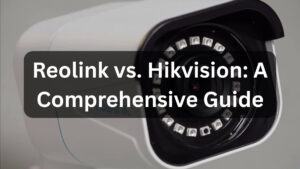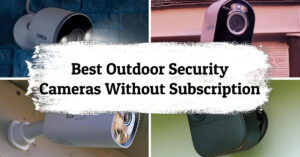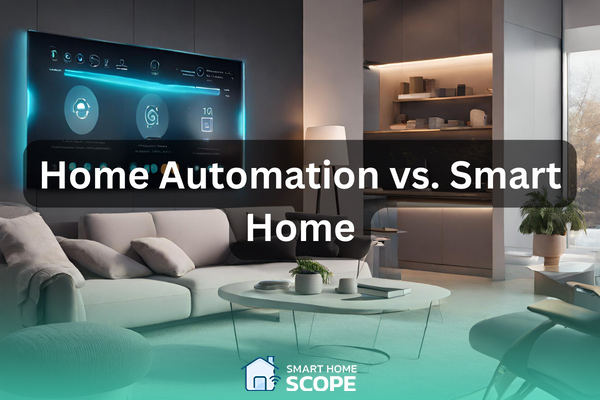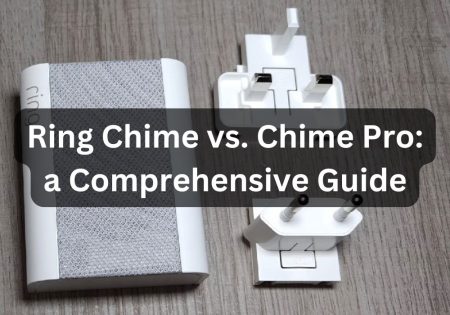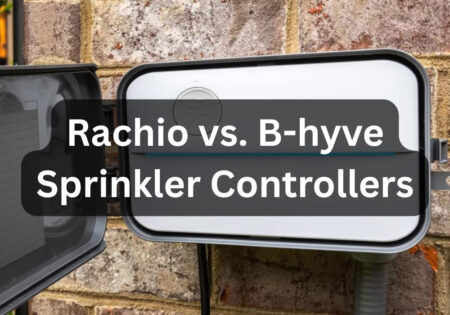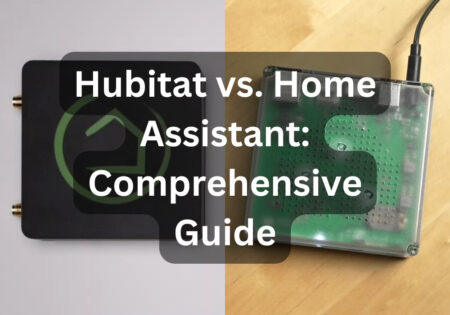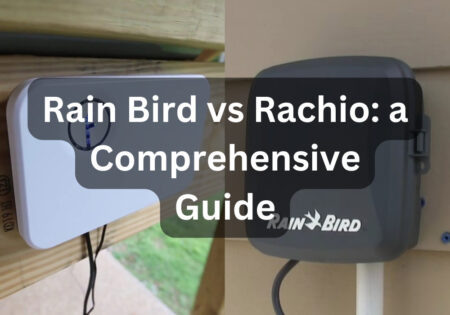What is the difference between smart home and home automation? Understanding the difference between smart homes and home automation is essential for those aiming to delve into the world of connected devices. I am Erfan Askari, the creator of Smart Home Scope, and in this article, I’ll compare smart home vs. home automation.
What is the Difference between Smart Home and Home Automation: Key Takeaway
Smart home is responsible for providing a platform in which you can control various smart gadgets manually. On the other hand, home automation minimizes human involvement in routine tasks such as changing thermostats or turning on security systems by automating them based on preset rules and schedules. Smart homes provide the infrastructure, while home automation optimizes functionality.
Understanding Smart Homes
The ultimate in household technology integration, smart houses combine efficiency and convenience with modern design. Fundamentally, a smart home consists of a network of interconnected gadgets that allow homeowners to manage their surroundings with a single voice command or button press.
Every component of a smart home is intended to make your life easier, from lamps that can dim or brighten their lights according to your mood to thermostats that adjust the room temperature to your preferences.
These gadgets are not separate entities but are connected through the Internet of Things (IoT), enabling them to form an interconnected ecosystem where everything runs smoothly according to your lifestyle and learns from it to ease your daily activities and save energy at home.
Imagine driving back home on a hot summer day to a perfectly cooled house or waking up to the aroma of freshly brewed coffee.
Exploring Home Automation
Home automation, which simplifies repetitive tasks for increased productivity and convenience, is the core technology behind smart homes. To automate lighting, climate control, and security systems such as cameras, sensors, controllers, and actuators need to work together. Creating a house that anticipates and responds to your needs without manual intervention is the goal of this automation, not merely remote control.
Consider your house’s blinds and thermostats that change automatically according to the time of day or the weather, or your security system that arms itself when no one is home. A vast range of actions may be programmed into home automation systems depending on certain triggers. For example, the system can turn off all lights when it senses the house is vacant.
The simplicity and security that home automation afford are what make it so appealing. Home automation can handle typical and repetitive tasks for you, allowing your focus to be on what truly matters instead of unimportant things! Home automation offers unimaginable conveniences and peace of mind, such as ensuring all doors are closed at night or having the perfect house temperature when you return home.
Smart Home vs. Home Automation: The Key Differences
There is a subtle but important difference between home automation and smart houses. Smart homes are characterized by networked gadgets that provide monitoring and control over lighting, temperature, entertainment systems, and other elements of the home environment. The homeowner’s quality of life is improved by the degree of control and personalization made possible by this interconnection.
However, home automation goes much farther in the direction of efficiency and ease by automating these devices’ operations. The whole point of home automation is setting systems to function based on specific criteria or schedules.
Examples include tying the thermostat to change at certain hours of the day or turning on the security system when no one is home. To avoid interruptions in service and enhance effectiveness, home automation proactively monitors these functions while smart homes provide the infrastructure and capabilities.
This difference is centered on integration and control. A smart home is a broad platform where various connected gadgets can be controlled through a smart hub or smartphone app, allowing users to monitor their devices and control them manually. Hubitat and Home Assistant are two popular smart hubs that you can read about on my Hubitat vs. Home Assistant guide.
In contrast, home automation relies on established rules and schedules to manage household gadgets and systems, thus taking over some of the drudgery of life without human involvement.
In essence, home automation streamlines the operation of devices to improve the efficiency of tasks, while smart homes act as platforms for this technology. Although the goals of both ideas are to enhance the living environment, they do so in complementary ways that consider how home technology is developing.
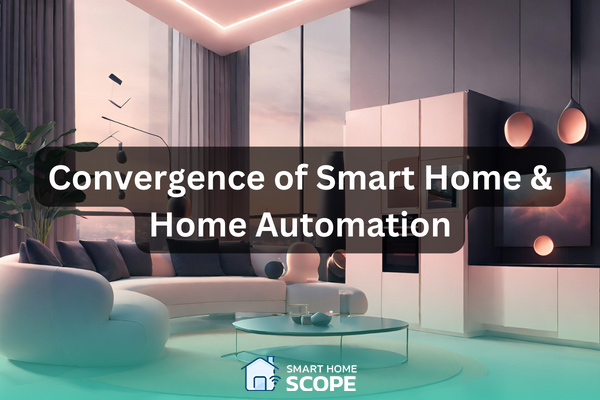
The Convergence of Smart Homes and Home Automation
As technology progresses, the line between home automation and smart homes is blurring, ultimately leading to a complete transformation of our living spaces. Combining the efficiency and independence of home automation with the all-encompassing management and connection of smart homes creates the best of both worlds.
The result of such convergence is a living space that responds to your commands, anticipates your needs, and adapts to them, ensuring that you live in a home that brings you convenience and efficiency.
We owe the integration of smart home and home automation to AI and machine advancements. A smart home system may, for example, automatically change the thermostat based on your preferred temperature settings at different times of the day or analyze your daily routine to optimize energy and lighting consumption, thereby saving expenses and reducing environmental effects.
The future of automated, smart living spaces is bright, as promised by trends pointing towards systems that are more intuitive and user-friendly, offering higher levels of automation. These progressions make your home more secure, energy-efficient, and interactive, revolutionizing the meaning of home.
This convergence is a result of both homeowner expectations, which have changed to include higher standards for their living spaces, and technological progress. There is infinite potential to create more intelligent, intuitive, and connected houses as home automation and smart homes continue to blend.
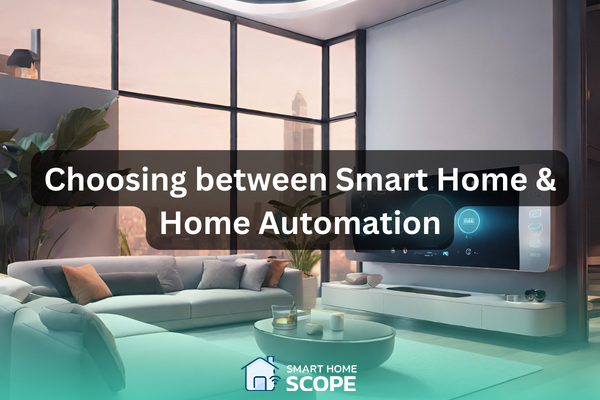
Choosing Between Smart Home and Home Automation
The choice between investing in home automation, smart home technology, or a combination of the two comes down to personal tastes, demands, and the required degree of efficiency and convenience. To assist in clarifying that decision, consider the following factors:
Determine Your Needs
Start by assessing your desired outcome. A smart home setup can be ideal if your objective is to have greater convenience with remote control over the appliances and gadgets in your house. However, home automation can be a better option if you want to automate everyday tasks for efficiency and energy savings.
Think About Convenience vs. Automation
Smart homes provide the ease of using a single command to manage a variety of home environment features. By automating these functions depending on your routines or habits, home automation goes one step further and requires less manual involvement.
Security and Energy Efficiency
Although they achieve it differently, both smart homes and home automation may increase security and improve energy efficiency. Determine which solution best fits your energy-saving objectives and security requirements.
Financial Implications
A smart house may require less money to set up initially than a fully automated home system, which would need more intricate programming and integration. Consider your spending limit and the potential long-term savings of each choice.
Future Scalability: Consider your home’s future. A smart home system might be an excellent place to start since it gives you the option to gradually add more automation features and devices.
Usability
Make sure the system you select is in line with your comfort level with technology. Both solutions need to provide easy-to-use control; nevertheless, the degree of complexity might differ based on the devices and automation level.
When making your choice, keep in mind that as technology advances, the line between home automation and smart homes becomes less and less obvious. The most popular approach that most homeowners tend to take is a hybrid one, where they leverage the benefits of both to create a smart home that is also intelligently automated.
Conclusion
What is the difference between smart home and home automation? Now that you understand the difference between smart homes and home automation, you can consider your needs and create a convenient and efficient home for yourself where a combination of smart home and home automation cooperate together.
FAQ
1. What are the advantages of combining home automation with smart home devices?
This approach helps you automate device operations that can enhance the convenience and efficiency of your home, along with providing decent personalization.
2. Can internet connectivity be required for home automation systems to function?
It’s true that some systems function without the internet by using local networks or direct connections.
3. What impact do smart houses have on energy conservation?
By enabling automation and remote control of energy-hungry appliances, making sure they run only when necessary.
4. What effects do home automation and smart homes have on security?
Automated systems and remote monitoring can greatly improve security, but they still need strong cybersecurity protections.
